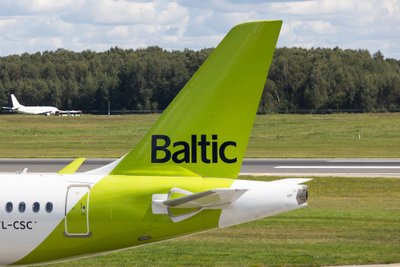He explained that the amount refers to money that some passengers have claimed back in the form of cash or gift vouchers.
Gauss compared that to roughly how much money airBaltic makes per day from new bookings. "So financially the airline can easily do this too, because some people speculate and say that this makes it difficult for us. No, not at all. It is standard business," he stressed.
Commenting on whether all passengers have been informed about the cancelled flights, Gauss said it is in the process, but almost all affected passengers have been informed.
"We are talking here about flights that are in the summer season. So it’s possible that someone who has a flight in September has not yet responded to our emails because it’s not that important to people yet," Gauss said.
The airBaltic CEO stressed that every passenger is informed individually. "If you have a ticket and we tell you that airBaltic cannot fly, then you want to be contacted personally. And airBaltic call center agents go through the individual needs of each passenger with them," said Gauss.
He said if airBaltic can offer another date for the flight, the ticket is re-booked, if someone chooses to go to another destination, airBaltic will offer it or refund the money.
"If someone has booked through a travel agency, the travel agency will contact the passenger and then airBaltic can refund the money," said Gauss.
He summarized that there are many different ways to deal with cancellations, but in general in the airline business there are situations where a flight can be cancelled.
"The fact that airBaltic cancels more than 4,000 flights affecting 50,000 passengers is normal for an airline of our size. If you remember back to the pandemic, airBaltic cancelled 800,000 passenger flights and had to refund EUR 80 million to passengers. And we did it because we were forced to suspend flights for 62 days," said Gauss.

He also said that the situation is not pleasant and that the airline has apologized to passengers who have suffered as a result, but the impact is not that great and, in his view, is now being disproportionately exaggerated.
As reported, the government coalition on Monday did not yet decide on replacing airBaltic CEO Martin Gauss and will instead wait for decisions of the airline’s shareholders.
Performance of the supervisory board of national airline airBaltic will be evaluated at the company’s shareholders meeting on January 21.
Transport Minister Kaspars Briskens (Progressives) stressed that airBaltic is a strategically important company for the country, which contributes directly not only to the aviation industry, but to the entire Latvian economy. In order to ensure continued growth of the airline, the company’s management has pledged to raise EUR 300 million for implementation of the airline’s business plan.
"People have to keep their promises and, if circumstances change, always have a clear plan B. We judge the work of the supervisory board and, in particular, its chairman, Klavs Vasks, based on results, correct and timely communication, and the ability to manage the company even in challenging times," said Briskens.
airBaltic has announced that it will cancel 4,670 flights from all its bases for the summer season 2025. The cancellations are a result of unexpected delays and prolonged engine maintenance by its supplier, Pratt & Whitney. The engine manufacturer’s inability to meet its timely maintenance obligations has impacted the operational capabilities of airBaltic’s Airbus A220-300 fleet, forcing the airline to adjust its summer schedule.

After this announcement, Briskens said on X that the Transport Ministry has instructed the supervisory board of national airline airBaltic to promptly explain the airline’s decision to cancel a number of flights and its impact on Latvia’s connectivity.
At the same time, Briskens reminds that the management of airBaltic – including Gauss and Vasks – must keep their promises to raise EUR 300 million to implement the company’s business plan and to ensure that airBaltic’s activities are in the interests of the state of Latvia and passengers.
It has also been reported that the share capital of airBaltic will be reduced by EUR 571.293 million in preparation for an initial public offering (IPO), the government decided at a closed cabinet sitting on August 30, 2024.
The terms of the share capital reduction state that airBaltic’s current share capital is EUR 596.473 million, which means that after the planned reduction it will be EUR 25.179 million.
Briskens said earlier that the talks with airBaltics’ strategic investor are not being held to sell a controlling stake but that the plan is to sell a minority stake in preparation for the IPO.
Bloomberg news agency reported, citing people familiar with the matter, that German national airline Lufthansa is considering taking a stake in airBaltic ahead of the Latvian state-owned carrier’s proposed IPO.
Briskens has not yet officially disclosed whether the potential strategic investor is Lufthansa, as well as how many shares in airBaltic could be sold to the investor and for how much. "Work is ongoing. There must be a mutual agreement to disclose such information. As soon as the transaction documents are finalized, both sides will immediately comment on it," the minister said earlier.
At the same time, Briskens stressed that the responsibility for the capital increase lies with airBaltic CEO Martin Gauss and Vasks. "The performance of the company’s management will be evaluated on the basis of the results achieved," the transport minister said.
As reported, in 2023 airBaltic’s audited turnover was EUR 664.289 million, up 33.2 percent on 2022, and the company made a profit of EUR 33.852 million, compared to a loss the year before.
In 2023, airBaltic carried 4.536 million passengers, which is by 35.7 percent more than in 2022, and conducted 44,100 flights, up 18.3 percent from a year ago.
The Latvian state owns 97.97 percent of airBaltic’s shares, while the financial investor, Danish businessman Lars Thuesen’s Aircraft Leasing 1, owns 2.03 percent.
